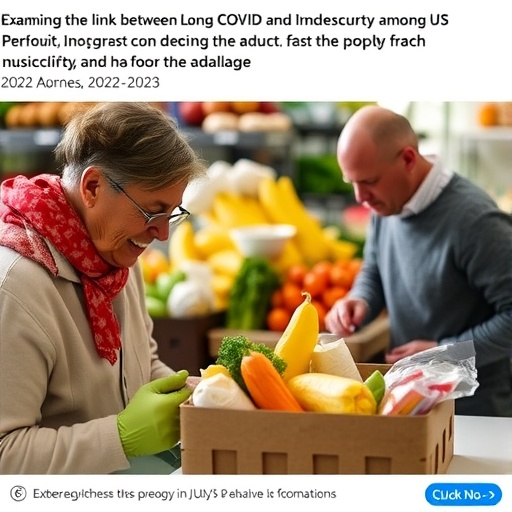A groundbreaking new study published in JAMA Network Open brings to light an often-overlooked determinant in the persistent and debilitating condition known as long COVID: food insecurity. As the global medical community continues to unravel the multifaceted nature of post-acute sequelae of SARS-CoV-2 infection (PASC), this research underscores the critical role that social determinants of health, particularly access to adequate nutrition, play in influencing both vulnerability and recovery trajectories.
Food insecurity, defined as the limited or uncertain availability of nutritionally adequate and safe foods, emerges here not just as a socioeconomic issue but as a modifiable health risk factor with profound implications for long COVID outcomes. The study’s findings indicate that individuals experiencing food insecurity have a significantly elevated risk of developing prolonged symptoms following an acute COVID-19 infection, highlighting a novel intersection between nutritional epidemiology and infectious disease pathology.
At the core of this research is an analysis of nutritional physiology and immune system interactions. Adequate nutrition is fundamental in maintaining immune homeostasis, facilitating appropriate inflammatory responses and tissue repair after viral insults. Chronic undernutrition or micronutrient deficiencies, common consequences of food insecurity, may impair these biological processes, resulting in inadequate viral clearance or exaggerated inflammatory cascades that propagate long-term symptomatology.
The study methodically examines epidemiologic data across diverse populations in the United States, integrating demographic variables such as age and socioeconomic status to delineate risk clusters. Adults facing food insecurity exhibited increased susceptibility to long COVID symptoms including fatigue, cognitive impairment, and respiratory difficulties. These clinical manifestations reflect the underlying pathophysiological consequences of nutritional deficits compounded by viral-induced tissue damage and immune dysregulation.
From a pathological standpoint, the research delves into mechanisms by which food insecurity may exacerbate disease susceptibility. Prolonged nutrient deprivation influences cellular metabolism and signaling pathways critical in antiviral defense, such as interferon production and T-cell activity. Furthermore, the intersectionality of food insecurity and chronic stress amplifies systemic inflammation, potentially priming the host for more severe and persistent post-infection sequelae.
Beyond biological mechanisms, the study emphasizes the urgent need for structural interventions. Expanding access to federal nutrition assistance programs like the Supplemental Nutrition Assistance Program (SNAP) is posited as a pragmatic approach to mitigate long COVID risks. Simplifying enrollment procedures and raising public awareness about these resources are instrumental strategies to enhance community resilience against COVID-19’s long-term health burdens.
The research further contextualizes these findings within the broader framework of public health and social policy. By recognizing food insecurity as a modifiable risk factor, it advocates for a multidisciplinary approach that integrates medical care with social support systems. This paradigm shift challenges healthcare providers and policymakers to address the root causes of disease susceptibility rather than solely focusing on symptomatic management.
In addition to highlighting nutrition’s role, the study offers compelling evidence connecting long COVID incidence to disparities in social determinants of health. The disproportionate impact of food insecurity among marginalized and economically disadvantaged groups contributes to inequities in COVID-19 outcomes, reinforcing systemic vulnerabilities that must be redressed to achieve health equity.
The implications of this research extend to future pandemic preparedness and chronic disease management. Understanding how nutritional deficits intersect with viral pathogenesis opens new avenues for therapeutic interventions, including targeted nutritional supplementation and tailored public health messaging that promotes food security as a cornerstone of infectious disease mitigation.
Clinicians are encouraged to incorporate screening for food insecurity into routine COVID-19 care protocols. Early identification of at-risk individuals may inform more comprehensive management plans, potentially attenuating the severity and duration of long COVID syndromes through timely nutritional support and social services linkage.
This innovative study enriches the scientific narrative surrounding COVID-19 by bridging clinical pathology, nutritional science, and social epidemiology. It fortifies the argument for holistic patient care models that transcend pure biomedical perspectives, embracing the complex interplay between environment, lifestyle, and infectious disease outcomes.
In sum, the research delineates a crucial dimension of long COVID risk that has hitherto been insufficiently recognized: food insecurity as a determinant of disease susceptibility and progression. Its evidence-based recommendations urge a systemic response encompassing nutrition policy reform, healthcare integration, and public health advocacy, proposing a transformative pathway to alleviate the enduring burden of the COVID-19 pandemic.
Subject of Research: Food insecurity as a modifiable risk factor for long COVID
Web References: doi:10.1001/jamanetworkopen.2025.30730
Keywords: Food security, COVID 19, Adults, United States population, Nutrition, Risk factors




